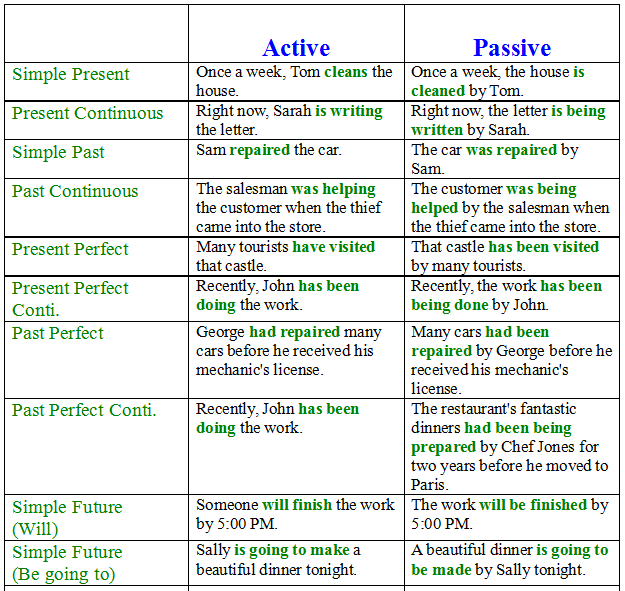Learn English
When to use the Passive Voice
- Active And Passive Voice
We can wright or speak our sentences in tow ways Active voice and Passive voice There are some rules to change active to passive and passive to active -ike In Active voice we say ? I write a latter. In passive...
- Narrative Tenses
Narrative tenses are the grammatical structures used to refer to the past time. They are used to tell stories and describe past events and states. Fifty years ago, schools used to be single sex. Past simple, past continuous, past perfect simple and past...
- How To Write English Sentences Using Verb Tenses
The process of writing an English sentence is much easier when the writer starts with a basic thought and systematically uses all the English writing tools to accurately express the complete thought. English Verb Tenses are tools designed to show relationships...
- Uses Of Different Forms Of Verbs
Uses of Different Forms of Verbs We now know that Verb has six forms: 1. Present Form 2. Past Form ...
- Combination Of Verbs
Auxiliary Verbs It is clear that Auxiliary Verbs are used only with the Non-finite Forms of a Verb when they are used as a verb taking a Subject. We now know that Verb has six Forms, namely:1. Present form2. Past form3. Present Participle4. Past...
Learn English
Passive Voice in English - Examples and Exercises
In English, the Passive Voice is used when the person or thing that is receiving the action is more important than the person or thing that is performing the action.
The structure of a sentence in the passive is as follows:
Object + To Be + Past Participle
Look at the structure of the following sentences in the active and the passive voice to understand the difference in structure.
- I sent Christmas cards to all my friends. (Active)
- Christmas cards were sent to all my friends. (Passive)
- The earthquake destroyed the town last night. (Active)
- The town was destroyed last night. (Passive)
In these examples, you can see it is the action / result that is the most important factor in the passive sentences.


When to use the Passive Voice
1. It is used when the person/thing performing the action is unimportant or unknown.
e.g. Our car was stolen last night.
e.g. Our car was stolen last night.
2. It is used when it is obvious who/what is performing the action.
e.g. Cameron was sacked last week.
e.g. Cameron was sacked last week.
3. It is used to describe factual information, especially when describing a process.
e.g. The lasagna is baked in an oven for 35 minutes at 250 degrees Celsius.
e.g. The lasagna is baked in an oven for 35 minutes at 250 degrees Celsius.
4. It is used in news reports and to give instructions.
e.g. Five people were arrested at a nightclub last night.
e.g. Five people were arrested at a nightclub last night.
While it is possible to use this structure in a large variety of tenses in English, it is rare to use the passive in Future Continuous, Present Perfect Continuous, Past Perfect Continuous or Future Perfect Continuous tenses.
Below are examples of the passive in a range of verb tenses.
To Be | Past Participle | Tense | |
The butter | is | kept here. | Present Simple |
The window | was | broken. | Past Simple |
The work | will be | done soon. | Future Simple |
The bridge | is being | repaired. | Present Continuous |
The cheese | was being | eaten by mice. | Past Continuous |
Our work | has been | finished. | Present Perfect |
The car | hadn't been | used much. | Past Perfect |
The house | will have been | built by then. | Future Perfect |
The shelf | can't be | reached. | Modal Verb ? Can |
The task | must be | done now. | Modal Verb ? Must |
The lesson | may be | finished. | Modal Verb ? May |
The car | ought to be | repaired. | Modal Verb |
- Active And Passive Voice
We can wright or speak our sentences in tow ways Active voice and Passive voice There are some rules to change active to passive and passive to active -ike In Active voice we say ? I write a latter. In passive...
- Narrative Tenses
Narrative tenses are the grammatical structures used to refer to the past time. They are used to tell stories and describe past events and states. Fifty years ago, schools used to be single sex. Past simple, past continuous, past perfect simple and past...
- How To Write English Sentences Using Verb Tenses
The process of writing an English sentence is much easier when the writer starts with a basic thought and systematically uses all the English writing tools to accurately express the complete thought. English Verb Tenses are tools designed to show relationships...
- Uses Of Different Forms Of Verbs
Uses of Different Forms of Verbs We now know that Verb has six forms: 1. Present Form 2. Past Form ...
- Combination Of Verbs
Auxiliary Verbs It is clear that Auxiliary Verbs are used only with the Non-finite Forms of a Verb when they are used as a verb taking a Subject. We now know that Verb has six Forms, namely:1. Present form2. Past form3. Present Participle4. Past...
